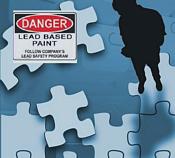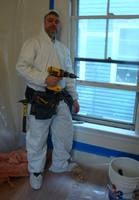Updates on MA RRP Rule From The MA Department of Labor Standards
 As EPA amends the RRP rule, renovators working in states that have taken over the rule from EPA need to know if and how these states incorporate the changes into their own rule. Yesterday I inquired with the State of Massachusetts to find out about a few recent amendments and changes.
As EPA amends the RRP rule, renovators working in states that have taken over the rule from EPA need to know if and how these states incorporate the changes into their own rule. Yesterday I inquired with the State of Massachusetts to find out about a few recent amendments and changes.
One of the good things about the state of Massachusetts taking over the RRP rule is that communications with the Department of Labor Standards (DLS) is much easier and much quicker than trying to get answers from EPA. I also find their staff is much more informed and always helpful. The Q&A below was conducted completely via email (I sent the questions out of the blue) and I got a complete and what I would call an intuitive response in less than 4 hours! Credit to the DLS!
Here is the Q&A
 Question: Can you tell me if MA allows the lead safe renovation supervisor to take paint chip samples same as EPA does?
Question: Can you tell me if MA allows the lead safe renovation supervisor to take paint chip samples same as EPA does?
DLS Answer: Massachusetts incorporates the federal protocol by reference in our regulation. LSR Supervisors are authorized to sample painted surfaces in accordance with their training. Of course, they must do adequate sampling for different painting histories of surfaces, document their findings, maintain records of testing and provide documentation to the property owner as required.
Question: Does MA require that the firm provide the renovation checklist to owners and tenants within 30 days of completion of final billing, whichever comes first (just like EPA)?
DLS Answer: Yes. DLS has the same documentation requirements as the federal rule.
Question: EPA requires towns and municipalities to become certified firms and have Certified Renovators before doing their own RRP work on town properties that are target housing and or Child Occupied Facilities. They can however hire out the work to a Certified Firm and therefore would not need to be a Certified Firm if the work is hired out to one. Does the Massachusetts law follow the same requirements?
DLS Answer: Yes. Massachusetts mirrors the requirement but offers the opportunity for the fee to be waived for property owners with trained employees working on their own properties.
You can find them listed on our LSRC list published on the DLS web pages.
 Question: Also, does MA now recognize LeadCheck for Drywall and Plaster?
Question: Also, does MA now recognize LeadCheck for Drywall and Plaster?
DLS Answer: Yes. But as usual, there is a caveat which is also applicable at the federal level. When the trained individual takes a sample – s/he must follow the prescribed protocols. In order to take advantage of the new approval; they must follow the new testing methods and adequately test surfaces. In some cases, many samples must be taken in order to effectively disclude the work under the rule.
Training Providers will likely being teaching the new methods, however, those who were previously trained will need to justify that they know how to sample in order to validate their findings. Of course, the safest path is to presume the presence of lead.
Question: Any other updates or clarifications I should know about?
DLS Answer: I know you are aware that DLS has been doing enforcement and civil penalties. We are still interested to have the regulated community provide us feedback to provide better regulations. I don’t have a specific date but we will certainly let you know when we are going back to public hearings to update our regulation.
Its spring and we are in the field doing compliance checks.

 Looking for accurate information about the EPA RRP rule?
Looking for accurate information about the EPA RRP rule?  While deleading activities conducted in residences and child-occupied facilities often involve work methods similar to those typically used in renovation, repair or painting (RRP) activities, such as replacing windows, painting and installing vinyl siding, the two types of activities are distinct from each other in terms of purpose and effect.
While deleading activities conducted in residences and child-occupied facilities often involve work methods similar to those typically used in renovation, repair or painting (RRP) activities, such as replacing windows, painting and installing vinyl siding, the two types of activities are distinct from each other in terms of purpose and effect. Once you have made the initial determination regarding whether your project is a renovation project or a deleading project, the next question is how to choose a contractor who is licensed and qualified to perform the work. Click on the following link to view a helpful guide on choosing a deleading contractor, “
Once you have made the initial determination regarding whether your project is a renovation project or a deleading project, the next question is how to choose a contractor who is licensed and qualified to perform the work. Click on the following link to view a helpful guide on choosing a deleading contractor, “ Variances in the rule requirements, from the EPA RRP rule and also from state to state, will make it difficult for renovators to understand the differences and keep up with amendments made by each entity. Renovators working in more than one state many have to become certified firms in each state they operate in and or also with the EPA. Are renovators better off if their states write a better thought out rule? Would renovators be better served if there was just one well written rule for everyone to follow? I predict that confusion may likely contribute to violations and fines for these renovators.
Variances in the rule requirements, from the EPA RRP rule and also from state to state, will make it difficult for renovators to understand the differences and keep up with amendments made by each entity. Renovators working in more than one state many have to become certified firms in each state they operate in and or also with the EPA. Are renovators better off if their states write a better thought out rule? Would renovators be better served if there was just one well written rule for everyone to follow? I predict that confusion may likely contribute to violations and fines for these renovators.  In July of this year Massachusetts took over administration and enforcement of the RRP rule.
In July of this year Massachusetts took over administration and enforcement of the RRP rule.  The MA DOS has also started conducting on-site inspections. Though most inspections are triggered by citizens reporting suspected violations, the DOS is also out in the field and is stopping by renovation projects as they come across them. In one of his recent blogs, RRP certification training provider and business coach, Mark Paskell of The Contractor Coaching Partnership, shares a
The MA DOS has also started conducting on-site inspections. Though most inspections are triggered by citizens reporting suspected violations, the DOS is also out in the field and is stopping by renovation projects as they come across them. In one of his recent blogs, RRP certification training provider and business coach, Mark Paskell of The Contractor Coaching Partnership, shares a 





